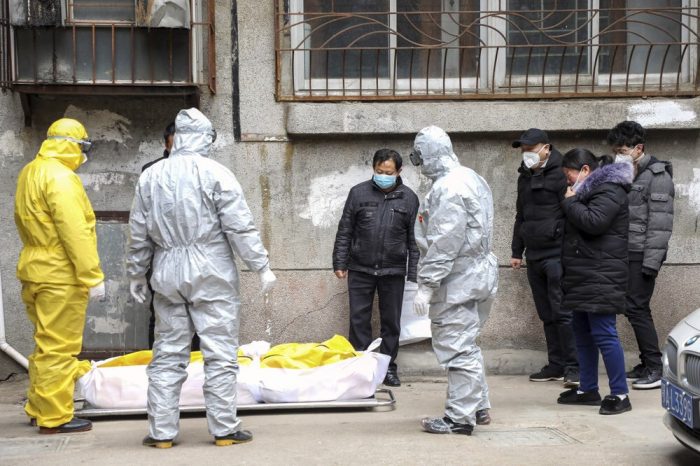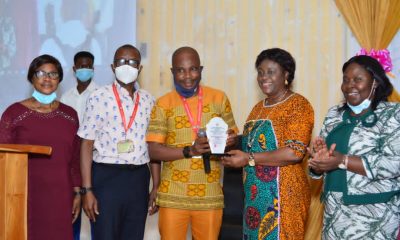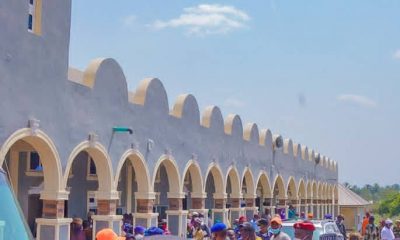Opinion
COVID-19: Africa Is Poorly Prepared But Ingenuity Offers Hope

By John Sparks
In Africa, the coronavirus has advanced through cities, towns and rural locales in a largely predictable way.
Every country on the continent has recorded at least one case of COVID-19 with the exception of Lesotho and the Comoros Islands. Both claim to be virus-free.
What has surprised the experts however is the relatively low number of people who have been diagnosed with the virus in Africa, particularly when compared with the US or Europe.
The most recent figures show the number of confirmed cases at around 28,000 with the death toll at 1,300. The numbers in US are at least 30 times worse.
However, experts think this situation is unlikely to last. The World Health Organisation estimates 10 million Africans could catch COVID-19 in the next six months and the virus will exacerbate the daily battle to survive.
Tens of millions live their lives on the edge, buying food if it is available and making money if there is work. When people get sick, healthcare is often inadequate and there are huge numbers who suffer from complications like HIV/AIDS. The coronavirus will make life more precarious.
Sky News has spoken to four experts in Congo-Brazzaville, Zimbabwe, Mali and Sudan. Together they paint a picture of a continent that is poorly prepared. But they also offer a message of hope rooted in determination and human ingenuity.
Dr Joyce Samoutou, is a doctor at the New Sight eye clinic in Congo-Brazzaville. She says she is an unadventurous person, but the University of Edinburgh graduate exchanged her practice in Leeds for work in remote communities like Oúesso.
Now she is trying to come up with a COVID-19 response with local officials and together they have set up an isolation centre at the local football stadium.
“I think the way we have survived the last few months has been trying to concentrate on what we can do rather than what we can’t do. I think that is the only way we can survive.”
The obstacles are extraordinary. Patients have to drive 12-14 hours for a COVID-19 test and there are no critical care beds. Plus, the nationwide lockdown puts ordinary people in an impossible position.
“We tell them stay at home as much as possible, work from home (but that) literally means no food for the families and they need to at least go out to get water, and so it’s kind of like, what would you rather do? Be infected or starve?”
Africa has been fortunate because the virus came relatively late to the continent – the first case in sub-Saharan Africa was not detected at the end of February. Countries like South Africa, Ghana and Nigeria moved swiftly to close schools, ban gatherings and impose lockdowns. But that does not mean they are prepared to deal with the consequences of mass infection.
Dr Norman Matara is the Secretary-General of Zimbabwe’s Association of Doctors for Human Rights. He holds a master’s degree in public health from Leeds University and also possesses bucket-loads of courage. Dr Matara is one of a small number of physicians who are prepared to criticise the people who run this beleaguered country.
“We knew (COVID-19) was coming. Our ministry of health continued telling us that they were prepared, but when the virus eventually reached here, we saw that the ministry was not prepared at all.”
Dr Matara says the government’s groundwork has been shambolic.
“The isolation centre that they identified did not have capacity to deal with severe cases of COVID-19. There were no ventilators, no ICU staff, no ICU nurses, no anaesthetists, so we don’t know what they were saying. How are we prepared when they do not even have ICU facilities to deal with one patient?”
Our team interviewed the physician as he played a game of pool with himself at home. Dr Matara will not work at his practice because he cannot get his hands on any personal protective equipment (PPE).
“There is basically not much that we can do… it is not exciting to be playing alone you know.”
Poor medical infrastructure and a shortage of specialist equipment pre-date the coronavirus crisis by decades but there are highly resourceful people in Africa who are trying to do something about it.
We met a remarkable 23-year old university drop-out called Mohamadou Kone, who is busy trying to build hospital-standard respirators and ventilators at a local laboratory.
“Here’s the problem,” said Mohamadou. “(For) the whole Malian population, we have less than 60 respirators.” That works out to be less than three respirators per one million people.
The youthful inventor has helped produce an automatic soap and water dispenser and a robotic ward cleaner. Now he and three colleagues are trying to perfect their respirator.
“You know, I want to be the best (computer) programmer in the world but the most important thing is to do something beneficial for you and the community… you don’t have to be perfect.”
Perfection is not something that Dr Abdelhameed Albushra is aiming for. For this 34-year-old, now running the COVID-19 treatment and isolation centre in the Sudanese capital of Khartoum, it is all about doing his best.
“We have maybe less than 500 ventilators in Sudan… and (there) is a very, very, big shortage of critical care beds. I tell you, if we have a disaster like what is happening in (the) US, Spain and Italy, I think it will go very bad here.”
Yet Dr Abdelhameed has chalked up plenty of crisis-level experience. Like many of the country’s doctors, he helped to organise a political revolution that dumped long-time dictator Omar al Bashir from power. Plus, he picked up experience treating the victims of al Bashir’s militiamen.
“I was working in Omdurman Hospital when the (militia) came in and attacked us. I am happy I am still here.”
It is the legacy of Sudan’s dictatorial regime however, that will test Dr Abdelhameed in the coming months.
“Healthcare was the least of their priorities, we have really poor health services, but like all doctors here, we are trying now to support the health care system. We worked together during the revolution and now we are fighting a bigger crisis.”
The challenge before him and other doctors, scientists and officials is huge.
Some hope the relative youth of Africans, with an average age of 19, will reduce the power of a disease that tends to target the old. But the experts know that most countries here do not have the capacity to deal with mass infection.
Nonetheless, there are decent and dedicated people on this continent who do everything they can to slow the disease.
•Culled from Skynews
-

 News5 days ago
News5 days agoInsecurity: Kogi Schools Resume On Monday
-

 Opinion4 days ago
Opinion4 days agoDon’t Pull the Plug: Why Nigerians Are Pleading for the U.S. to Extend Its Police Training Program — and Why It Must Synergize With New Military Arrivals
-

 Crime4 days ago
Crime4 days agoVigilante Reportedly Shoots Colleague Dead In Plateau
-

 News2 days ago
News2 days agoRamadan: Osun Cleric Urges Compassion Among Muslims As Asejere Distributes Relief Materials To 537 Beneficiaries













